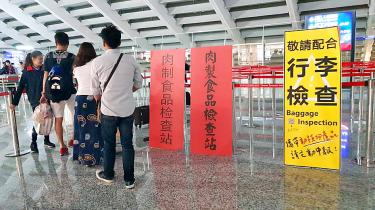With South Korea confirming an outbreak of African swine fever, the Council of Agriculture (COA) yesterday said that travelers caught bringing in pork products from that country would be fined a minimum of NT$200,000 (US$6,444).
Taiwan has been striving to keep the deadly swine disease at bay since China reported the first outbreak in August last year and the disease has continued to sweep across Asia.
The fine was put in place at 1pm yesterday after South Korean Minister of Agriculture Kim Hyun-soo said that the nation’s first case of the highly contagious disease was confirmed yesterday in tests on five pigs that died on Monday evening at a farm in Paju, a town near the border with North Korea.
After North Korea reported an outbreak in late May, South Korea was included in the council’s list of countries with a higher risk of transmitting the disease, it said.
The carry-on luggage of tourists returning from high-risk countries have to undergo X-ray scans at customs, it said.
In addition to countries that have reported an outbreak of African swine fever — China (including Hong Kong and Macau), Mongolia, Vietnam, Cambodia, North Korea, Laos, Myanmar, the Philippines, South Korea and Russia — the council added Malaysia, Singapore, Indonesia and Brunei to its high-risk list earlier this month, even though they have not reported any infection cases.
Those caught attempting to bring pork products from countries that have reported an epidemic are to be fined NT$200,000 for a first-time offense and NT$1 million for repeat offenses, the council said.
Foreign tourists who fail to pay the fine for illegal pork imports at customs would be denied entry into Taiwan, it added.
As of Sunday, the government had issued 534 tickets of NT$200,000 each for travelers found carrying banned pork products, including 298 to Chinese tourists and 170 to Taiwanese travelers.
Of the 534 tickets, 491 were for attempting to bring in pork products from China, 42 from Vietnam and one from the Philippines.
The South Korean agriculture ministry later yesterday said it was also looking into a suspected second case from a farm in the nearby town of Yeoncheon, where the owner reported the death of a pig, and that test results were expected today.
Officials were yesterday planning to complete the culling of about 4,000 pigs raised at the Paju farm and two other farms run by the same family.
Seoul also strengthened efforts to disinfect farms and transport vehicles, and ordered a 48-hour standstill on all pig farms, slaughterhouses and feed factories across the nation to prevent the spread of the disease, which threatens a massive industry that involves 6,000 farms raising more than 11 million pigs.
Additional reporting by AP
Source: Taipei Times - 2019/09/18





















